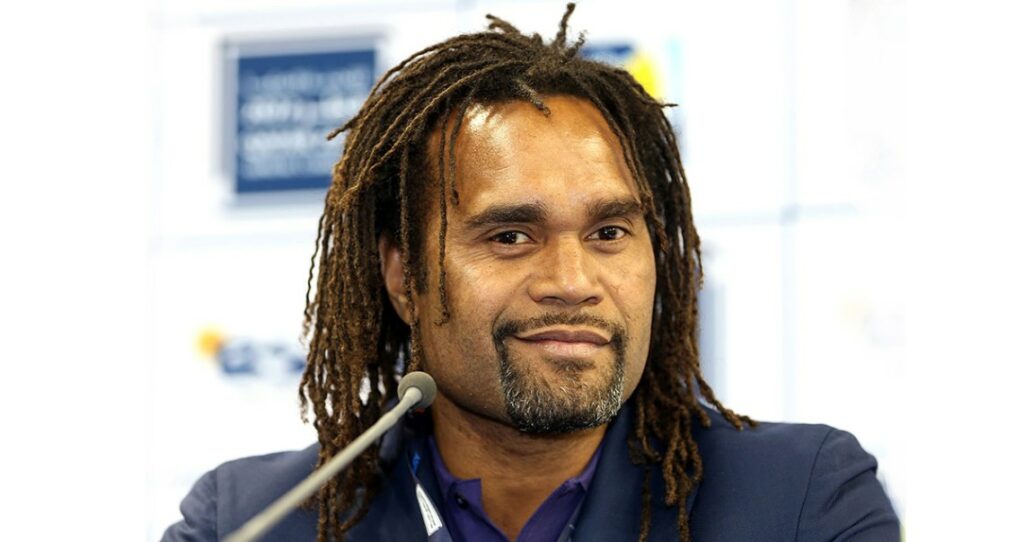‘The Gazelec Gunner’ … Marc-Kanyan Case.
The talented trio helped Gazelec win the Championnat de France in 1968 and gain promotion to the second professional division. That brought them to the attention of France’s Olympic selectors.
Mexico 1968
Teamboueon and Case were both chosen to start France’s opening game on October 13, 1968, at Cuauhtemoc Stadium, Puebla, against little-regarded Guinea, ironically a former French colony.
France were held 0-0 at half-time, but dominated the second half to run out 3-1 winners to get their campaign on the right track. Gerard Hallet and Daniel Horlaville were among the scorers and both ended up at Paris Saint-Germain with Horlaville picking up one cap for the French senior side.
Two days later, France shocked the host nation, winning 4-1 in front of 100,000 fanatical supporters at the famous Azteca Stadium.
The win was largely down to the New Caledonian influence: Case scored the opening goal, Teamboueon notched the second, an own goal gave France a third, and Case rounded off the scoring in the 69th minute.
France had one foot in the knockout stage and, at worst, needed to avoid a heavy defeat against Colombia. The South Americans had already been eliminated but still defeated the fancied French 2-1, with Teamboueon scoring in the second half.
Despite that shock loss they were into the quarter-finals as Guinea lost to Mexico. In the knockout round they faced Japan, the surprise side of the tournament with a win over Nigeria and draws against Brazil and Spain easing them into the next stage at the expense of the fancied Brazilians.
Alas, it was not France’s evening on October 20 at the Azteca, as Japan upset them 3-1. Teamboueon put France on level terms after 32 minutes but it proved fruitless as Japan scored twice in the second half.
During the Games, Case met 200 metres world record beater and gold medallist John Carlos who famously raised his fist in a black power salute on the podium alongside compatriot Tommie Smith.
He later told the Football Federation of New Caledonia that Mexico was the greatest moment of his sporting career.
“It was the greatest memory of my life. It was such a beautiful journey, we were proud, because to be in the Olympic Games at the Estadio Azteca in front of 100,000 people is something incredible.”
After the Olympics, Case turned professional and reached the 1972 Coupe de France final with another Corsican side, Bastia.
Teamboueon returned to represent New Caledonia at the 1969 South Pacific Games in Papua New Guinea. New Caledonia got the better of Tahiti in the final to win the gold medal, with Teambouean scoring once.
The striker would torment a visiting New Zealand side, scoring once in a 2-0 win in Noumea on July 27, 1969.
After dashing along the left wing, he slammed the ball past goalkeeper Derek Phillips from what, the New Zealand Soccer Annual 1970 described as “an impossible angle”.
Two days later, Teamboueon scored New Caledonia’s second goal in a 3-2 win against the tourists, again in the capital, to comfortably win the three-match series.
He retired from playing in 1972 after suffering several injuries and knee operations and, on retirement from the game, became a sports educator and later a politician.
Case may have played for France in the Olympics but Jacques Zimako was the first Kanak to represent the mother country at senior level, doing so 13 times between 1977 and 1981.
While Zimako was involved in the successful qualifying campaign for the 1982 World Cup, he missed out on a spot in the squad for Spain.
‘Zigzag’, as he was dubbed due to his ability to evade defenders, played for Saint-Étienne, Bastia and Sochaux, and won a Ligue 1 title in 1981 with Saint-Étienne.
Back in New Caledonia, Zimako helped New Caledonia to the gold medal at the 1987 Pacific Games, after they defeated Tahiti 1-0. He would later coach the national team.
Craig Stephen
Craig Stephen writes about football for a number of publications, and for RNZ. He is the author of Bombs and Boots, a book that tells how New Zealand football came of age in the 1960s and 1970s.
More football stories
Source link : https://www.friendsoffootballnz.com/2024/07/17/how-two-players-from-oceania-shone-at-the-1968-olympic-games-in-mexico/
Author :
Publish date : 2024-07-16 17:52:00
Copyright for syndicated content belongs to the linked Source.
